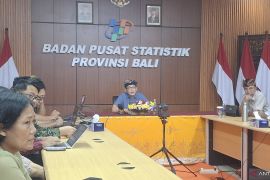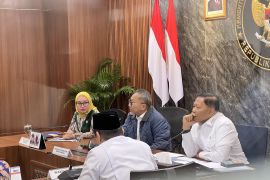"The elections in the next few months will have an impact on sectoral economic activity because it will increase activity in the public administration sector due to increased social spending as well as the completion of infrastructure and national strategic projects," Riefky remarked.
Riefky made this statement at the Indonesia Economic Outlook 2024 themed Political Transition in the midst of the "Higher-for-Longer" era, here on Friday.
He remarked that spending allocation ahead of the election had been recorded since the second quarter of 2023, wherein the government and public administration spending grew rapidly to 8.15 percent yoy as compared to only 2.09 percent yoy in the first quarter of 2023.
In addition, the construction sector recorded significant growth, from only 0.32 percent yoy in the first quarter of 2023 to 5.23 percent yoy in the second quarter of 2023.
"The period leading up to the election will also encourage domestic consumption, trade in general, as well as spending on communications, media, and advertising," Riefky noted.
He said various Indonesian economic data up to the third quarter of 2023 had shown positive achievements, so it would support national economic growth in the remainder of 2023.
This data includes investment realization that increased 7.0 percent yoy to Rp374.4 trillion and the trade balance that recorded a surplus of US$3.42 billion in the third quarter of 2023.
In addition, the Consumer Price Index (CPI) inflation data as of October 2023 is still maintained at the level of 2.56 percent (yoy), or within the Bank Indonesia's (BI's) target range of three percent, give or take one percent.
He projects that credit distribution will grow higher at the end of 2023, considering that credit as of September 2023 had grown 8.96 percent yoy, and third party funds (DPK) had grown 6.54 percent yoy.
However, Riefky reminded that the slowdown in global demand coupled with the "higher-for-longer" monetary policy of central banks globally has encouraged capital outflows from various developing countries, including Indonesia, thereby causing a depreciation of the rupiah exchange rate.
He said this has the potential to weaken the manufacturing sector in the remainder of 2023, considering that Indonesia's exports are highly dependent on global commodity prices and Indonesia's import profile is dominated by raw materials and capital goods.
"Maintaining the stability of consumer confidence levels, price levels, and exchange rates is the main key to reducing the negative impact on domestic sectoral performance," Riefky stated.
Related news: Govt furniture spending must focus on domestic products: Widodo
Related news: Southern West Java can be new economic growth driver: BI
Related news: Indonesia contributing greatly to ASEAN economic growth: Minister
Translator: Muhammad Heriyanto, Katriana
Editor: Sri Haryati
Copyright © ANTARA 2023












